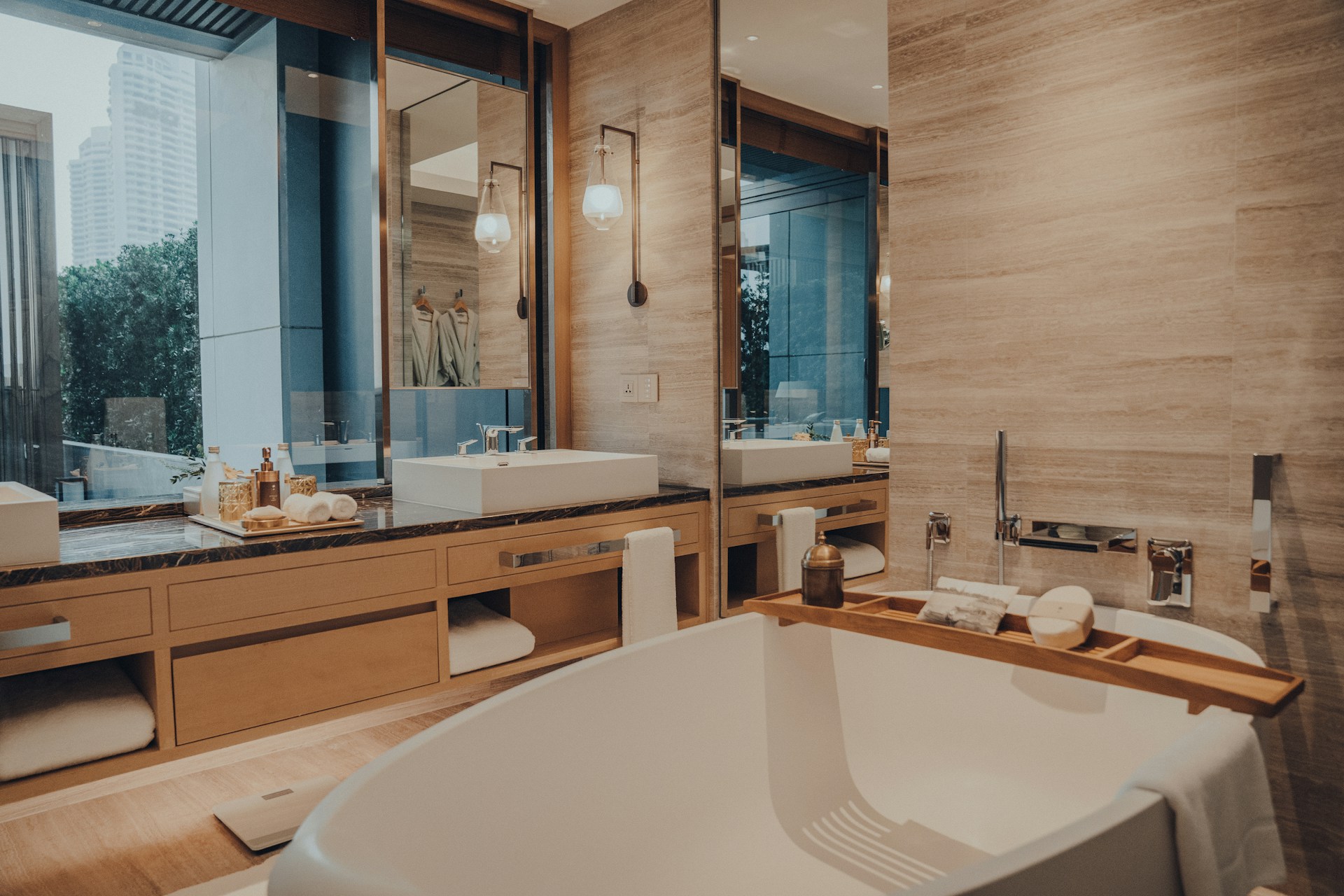Photo by Masato Tsuchiya on Unsplash
Why Eco-Friendly Bathroom Renovation Matters
Imagine transforming your bathroom into a sustainable sanctuary. An eco-friendly renovation reduces your carbon footprint, conserves resources, and saves money in the long run. It’s not just about aesthetics — it’s about creating a space that respects the environment.
Environmental and Financial Benefits
Sustainable choices can lower utility bills, enhance indoor air quality, and contribute to a healthier planet. Plus, the initial investment often pays off through reduced energy and water costs.
Planning Your Sustainable Bathroom Renovation
Setting Eco-Friendly Goals
Start with a clear vision. Do you want to minimize water waste, use renewable materials, or maximize energy efficiency? Outline your priorities to guide your renovation.
Researching Green Materials and Practices
Explore options like recycled tiles, bamboo flooring, and energy-efficient fixtures. Look for certifications like Energy Star and LEED for reliable eco-friendly standards.
Choosing Sustainable Materials
Flooring Options
Bamboo and Cork: Durable, renewable, and stylish. These materials offer a warm and natural aesthetic.
Recycled Tiles: Tiles made from post-consumer materials add character while reducing landfill waste.
Wall Finishes
Low-VOC Paints: Avoid harmful chemicals and improve indoor air quality with low-VOC or VOC-free paints.
Reclaimed Wood: Add a rustic charm with wood repurposed from old buildings or furniture.
Water Efficiency
Low-Flow Fixtures
Toilets: Dual-flush models can save gallons of water per flush.
Faucets and Showerheads: Aerated designs maintain pressure while reducing water usage.
Greywater Recycling Systems
These systems reuse water from sinks and showers for flushing toilets or watering plants, reducing waste significantly.
Rainwater Harvesting for Bathrooms
Install a rainwater collection system to supply non-potable water for your bathroom needs.
Energy Efficiency
LED Lighting
Switch to LED lights for a longer lifespan and lower energy consumption compared to traditional bulbs.
Solar Water Heaters
Harness renewable energy to heat your water, cutting down on electricity usage.
Energy-Efficient Ventilation Systems
Ensure proper air circulation with systems designed to use less power without compromising effectiveness.
Recycling and Reusing
Upcycling Old Fixtures
Repurpose vintage sinks, bathtubs, and mirrors to give them a second life.
Repurposing Materials from Demolition
Salvage tiles, wood, and other materials from your existing bathroom to minimize waste.
Sustainable Decor Choices
Choose bath mats and towels made from organic cotton or bamboo. Incorporate plants and natural accessories for a refreshing touch.
Green Cleaning Practices
Ditch harsh chemicals for eco-friendly alternatives like vinegar, baking soda, and essential oils. Adopt reusable cleaning cloths to reduce waste.
Budget-Friendly Sustainable Upgrades
Small Changes That Make a Big Impact
Replace old light bulbs with LEDs, install faucet aerators, and switch to biodegradable soap dispensers.
DIY Eco-Friendly Renovation Tips
Get creative with DIY projects, like building shelves from reclaimed wood or refinishing existing cabinets.
Common Mistakes to Avoid
- Overlooking Water Efficiency: Ensure every fixture prioritizes conservation.
- Choosing Style Over Sustainability: Don’t sacrifice eco-friendliness for fleeting trends.
Conclusion
Sustainable bathroom renovations are a win-win. They enhance your home’s value, reduce environmental impact, and create a healthier living space. Start small, stay consistent, and remember that every step counts toward a greener future.
FAQs
- What is the most eco-friendly flooring option for bathrooms?
Bamboo and cork are excellent options because they are renewable, durable, and visually appealing. - Are low-flow fixtures worth the investment?
Absolutely! They save water and reduce your utility bills over time. - How can I recycle old bathroom materials?
Donate usable fixtures, repurpose materials for DIY projects, or find local recycling centers. - What is a greywater system, and is it expensive to install?
A greywater system collects and reuses water from sinks and showers. While the initial cost may be higher, long-term savings and environmental benefits make it worthwhile. - Can I renovate sustainably on a small budget?
Yes! Focus on small, impactful changes like LED lighting, low-flow fixtures, and repurposing materials.
You may also like
Bathroom Water Conservation: High-Efficiency Toilets, Showerheads and Faucets
5 Eco-Friendly Additions to Add to Your Bathroom
How to Conserve Water In Your Home
Effective Ways to Save Water With Green Plumbing

